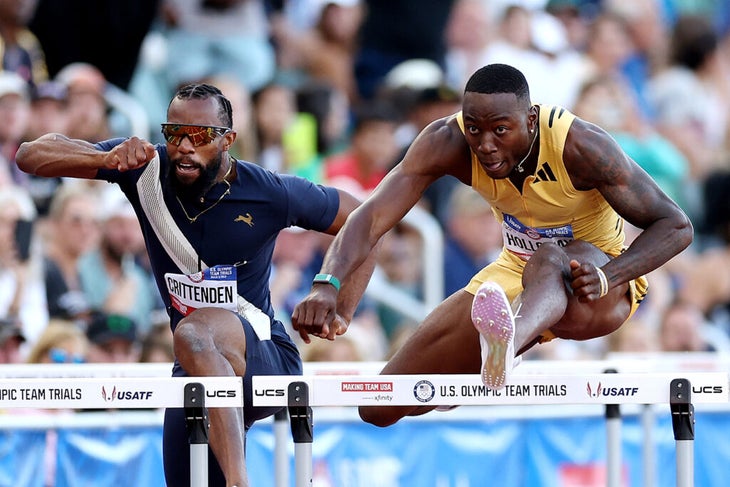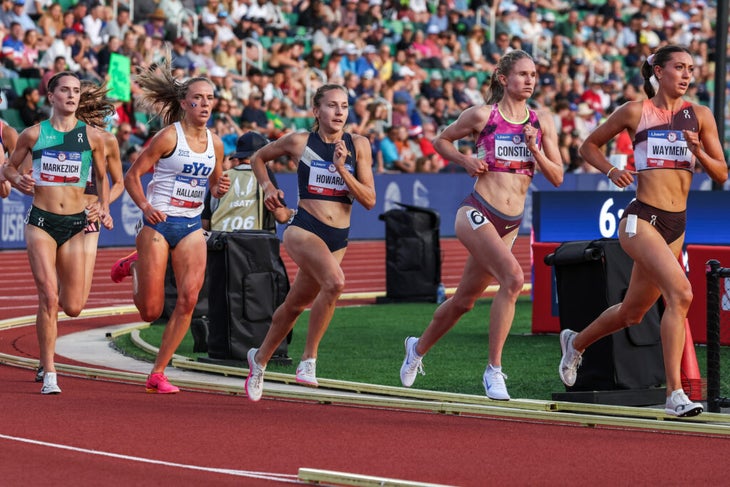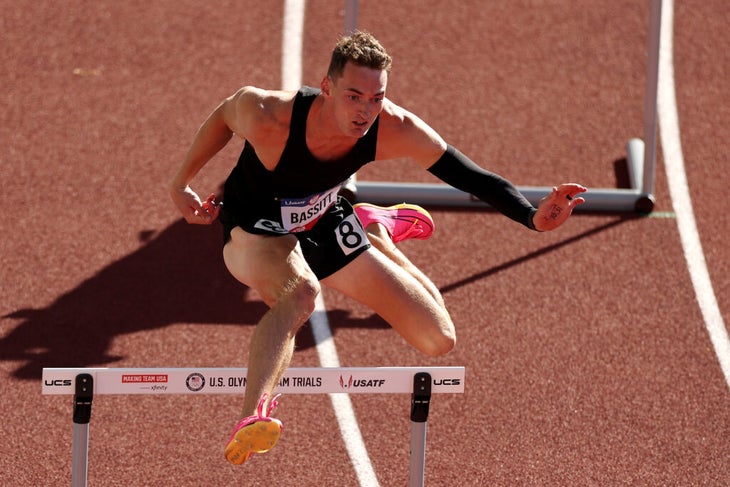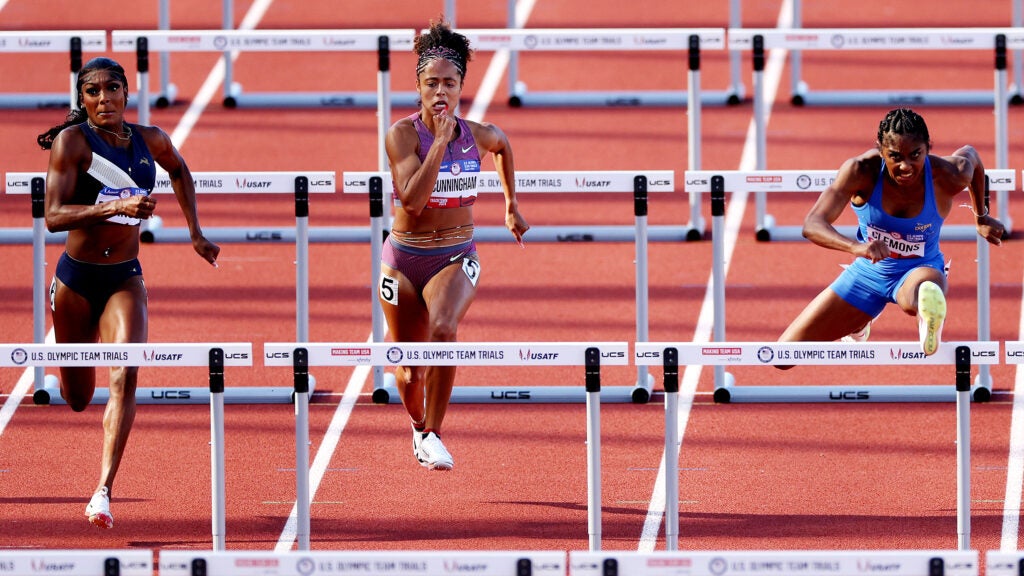“], “filter”: { “nextExceptions”: “img, blockquote, div”, “nextContainsExceptions”: “img, blockquote, a.btn, a.o-button”} }”>
New perk: Easily find new routes and hidden gems, upcoming running events, and more near you. Your weekly Local Running Newsletter has everything you need to lace up!
>”,”name”:”in-content-cta”,”type”:”link”}}”>Subscribe today.
[Editor’s note: Christina Clemons advanced to the June 30 finals of 100-meter hurdles but finished seventh in 12.61 and didn’t make the Olympic team.]
Just before she got into the starting blocks for her U.S. Olympic Trials 100-meter hurdles preliminary race on Friday night in Eugene, Oregon, Christina Clemons laughed out loud.
In what is normally a very serious moment for athletes and spectators, Clemons understood the humor and chuckled along with the audible guffaws from the near-capacity crowd at Hayward Field when the stadium announcer mentioned the fact that she was racing for Doritos.
“I know it’s supposed to be serious, but they said ‘Doritos,’ and I just kind of chuckled because people in the stands started laughing,” Clemons said. “And then somebody yelled out ‘Doritos for President!’ and I’m like, ‘Oh my gosh, like I have to get serious guys! Come on!’”
Believe it or not, Clemons is a professional hurdler sponsored by Doritos. The relationship started in 2021 after Clemons wore a pair of earrings shaped like Doritos at the Covid-delayed U.S. Olympic Trials, and then went viral on social media and earned her the nickname “Cool Ranch Clemons.” But back then, Clemons was sponsored by Adidas, which limited the creative freedom for having a co-branded racing kit.
However, entering the U.S. Olympic Trials this time around without a sponsor, the 34-year-old Clemons reconnected with her marketing connections at Frito-Lay and now she’s earning an undisclosed financial stipend and wearing a royal blue two-piece racing kit with small embroidered Doritos logos.
Yep, Cool Ranch Clemons is back, and she means business. She won her preliminary race in 12.56 seconds and advanced to Saturday’s semifinals with the hopes of making it to Sunday’s finals where she’d have a shot at making it to the Paris Olympics.
“When I wore the earrings in 2021, it went crazy on social media, and because of that, they reached out and it kind of took off from there,” said Clemons, who admits her favorite flavor of Doritos is actually Sweet Chili and not Cool Ranch. “And so I reached back out this year because I’m no longer with Adidas. And they jumped on it immediately. So it’s been cool and really fun because they’ve been very, very supportive.”
RELATED: How to Watch the U.S. Olympic Trials for Track and Field
Trying to Get Paid
Making ends meet as a professional track and field athlete is no easy gig, especially for runners on the cusp of the top-tier level.
Last winter, Noah Lyles signed what was called the richest contract in the sport of track and field since the retirement of Usain Bolt, a multi-year deal with Adidas that extends through the Los Angeles Olympics in 2028. Sha’Carri Richardson makes upwards of $2 million a year from Nike (but reports of her five-year, $20 million deal was pure Internet fiction), and Sydney McLaughlin-Levrone has a lucrative multi-year deal with New Balance.
The top stars in the sport are well-paid by big brands, but there isn’t much of a trickle-down effect. Clemons had been sponsored by Adidas since she turned pro in 2012, and she continued to run well into her early 30s, but she wasn’t re-signed for the 2023 season.
She’s had a very good career—punctuated by a fifth-place finish at the 2017 World Athletics Championships in London and a silver medal in the 60-meter hurdles at the 2018 World Indoor Championships—but she’s by no means a household name or even a regular member of Team USA, partly because injuries have interrupted consistent progress and because competition is fierce in the U.S.
In 2021, she finished third in the U.S. Olympic Trials in the 100-meter hurdles to earn her first Olympic team berth in Tokyo, where she advanced to the semifinals but narrowly missed making it to the finals. She sat out the 2023 season after giving birth to a baby boy, but she came back strong in 2024, placing 10th at the indoor world championships in March and entering the Olympic Trials ranked 15th in the world in the 100-meter hurdles.
“Regardless of how I run, for me, a company doesn’t determine my value and it does not determine my athleticism,” she said. “I’m not going to just be done with the sport because a company’s saying, ‘Oh, we’re not going to support you anymore.’ That’s cool, but I’m still going to do what I’ve been doing, which is being one of the best hurdlers in the world. That’s why I’m about. That’s who I am.”
RELATED: What You Need to Know About the U.S. Track and Field Olympic Trials
Working to Make it Work
On Friday night, Freddie Crittenden had a career-defining moment in the U.S. Olympic Trials, finishing second in the 110-meter hurdles in a personal best 12.93 seconds to secure a spot on Team USA that will compete in the Paris Olympics later this summer. But unlike race winner Grant Holloway, who has a lucrative multiyear deal with Adidas, or third-place finisher Daniel Roberts, who is sponsored by Nike, Crittenden worked a variety full-time jobs up until recently, which is why he’s so grateful to receive modest support from the Tracksmith Amateur Support Program.

When Crittenden graduated from Syracuse in 2017 as a two-time All-American hurdler, he figured he would turn pro and sign with a shoe company and make a living as a track athlete. But he found that a lot easier said than done. Making it on the pro circuit isn’t an easy gig—the competition is fierce and you have to perform at the highest level to attract a sponsor, otherwise you have to find a way to make a living that’s flexible enough to allow you to train everyday and travel to meets. (And lucrative enough to pay for basic healthcare, body work, nutritional supplements, airline tickets, hotels, and, of course, running gear.)
After a combination of modest results and unfavorable events between 2017 and 2019—including a couple of DNFs after hitting hurdles, a fourth-place finish at the U.S. championships in 2018—Crittenden was never able to sign with a shoe brand, even though he was close on a couple of occasions. He continued to work hard and had moments of success, lowering his personal best to 13.17 at a Diamond League meet in France in late 2019.
“That left me in a space where shoe companies and sponsors were like, ‘We don’t want to bet on this guy. You know?’” Crittenden said. “So a day in the life for me, to be honest, has been to wake up in the morning, train, go home, eat lunch, then go to work somewhere.”
Although he came close to quitting in late 2020 when a severe hamstring injury sidelined him for a while, and again in 2021 when he finished a disappointing eighth at the U.S. Olympic Trials, he never gave up. Along the way, he’s done whatever he could to make ends meet while still having enough flexibility to keep training. He worked in retail at a GameStop shop. He worked in a warehouse. He worked as a substitute teacher for several years.
With emotional and financial support from his wife, Tor, a Phoenix-based attorney, Crittenden kept his dream alive and had a breakthrough season in 2022, finishing fifth at the USATF Outdoor Championships in 13.14 and then winning the NACAC Championships in the Bahamas in 13.00. Last year, he finished third at the U.S. championships in Eugene in 13.23, which earned him a spot on Team USA for the world championships in Budapest.
Consistently running under 13.20 all summer, he made it to the finals and finished fourth in 13.16.
Lately he’s worked for G Road, a Phoenix-based nonprofit dedicated to supporting kids and young adults as they approach adulthood. It was started by his cousin Daniel Stanton, who understood Crittenden needed a gig that offered stability and flexibility.
“As a young guy, I was banking on, ‘I’m gonna run fast and I’m going to make a (U.S.) team and I’m going to make some money’,” he said. “But five years down, the road and the money’s not coming in, you’ve got to figure something out, you know? So, I started dabbling with jobs that fit into my training schedule and figuring it out.”
Crittenden worked for G Road from September until May and also signed on to Tracksmith’s Amateur Support Program in early 2023, which provides a small quarterly stipend, running apparel and training shoes for about 40 athletes in all disciplines of track and field.
RELATED: Sydney McLaughlin-Levrone Breaks World Record in U.S. Olympic Trials Victory
Supporting the Dreams of Amateurs
Started prior to the Covid-delayed Olympic Trials of 2021, the Tracksmith program was an evolution of a basic support program it created for runners who qualified for the 2020 Olympic Trials Marathon in Atlanta. In 2021, Tracksmith kits were plentiful throughout the Olympic Trials, especially after 17 of the 31 athletes who were competing at Hayward Field advanced to the finals of their event.
By the time the meet concluded, five athletes—Mason Ferlic (men’s 3,000-meter steeplechase), Rudy Winkler (men’s hammer throw), Rachel Dincoff (women’s discus), Kara Winger (women’s javelin) and Val Constien (women’s 3,000 steeplechase)—had finished in the top three of their events to earn a spot on the U.S. Olympic team and an undisclosed financial bonus from Tracksmith.
Just as it did in 2021, the brand rented a house a few blocks from Hayward Field that became has become an ASP hospitality suite with 24-hour concierge service for the its athletes, helping them out with everything from rides to and from the airport, a place to hang out and relax, a quick trip to the grocery store, and even physio and massage treatments from therapists it has hired out for 10 days.
Prior to his Olympic Trials finals race on Friday, Crittenden and some of his Phoenix Track Club teammates stopped by the Tracksmith House to have lunch, play some pool, and just relax with other athletes.
“I think we’ve always wanted to try to bridge that gap for the people that are still trying to compete at this level but aren’t able to get what would be considered a traditional professional sponsorship,” Tracksmith co-founder and CEO Matt Taylor said on Friday before competition began at Hayward Field. “When you leave college, a lot of athletes feel alone. They lose the camaraderie of being on a team. And that’s another nice part of it that the athletes have said they like about the program is they actually feel like they are part of a team again.”
Soon after the last Olympic Trials, Ferlic signed with Adidas and continued racing at a high level while pursuing a PhD at the University of Michigan. Teenage phenom Hobbs Kessler also wore Tracksmith gear in 2021 before signing with Adidas on the eve of the Olympic Trials. This time around in Eugene, Kessler finished third in the finals of the 1500 meters to punch his ticket to the Paris Olympics. Meanwhile, Constien, who signed with Nike last year, qualified again this year in the 3,000-meter steeplechase.

At this year’s Olympic Trails, six athletes in the Tracksmith Amateur Support Program—Crittenden, Chris Bailey (men’s 400 meters), Marisa Howard (women’s 3,000-meter steeplechase), Curtis Thompson (men’s javelin), Kara Winger (women’s javelin) and Justin Stafford (men’s hammer throw made Team USA for the Paris Olympics.
“We want them to know that there’s no downside to being a part of our program,” said Nick Willis, a five-time Olympian and two-time medalist in the 1500 meters for New Zealand, who manages the Amateur Support Program for Tracksmith. “We want this to be a bridge or a launch pad until their next phase, and so we hope those who do have success are able to have bigger and better opportunities. And we also hope that their inspiration will open up opportunities for those who are still waiting in the wings to join the program as well.”
RELATED: Ticket to Paris: Nikki Hiltz Wins Fastest Ever U.S. Olympic Trials 1500-Meter Final
Unsponsored is the New Sponsored
While it’s easy to spot high-profile professional athletes in race kits from Nike, Adidas, Hoka, Under Armour, Adidas and New Balance, roughly half of the 1,000 athletes competing in the U.S. are either collegiate or high school athletes or unsponsored competitors without any brand sponsorship at all—even though many still wear the uniform of a big-name running brand.
In 2023, indie running apparel brand Bandit Running debuted its Unsponsored Project to provide unbranded gear and a modest cash stipend to eight athletes at the U.S. track and field championships, helping Ahmed Muhumed (Hoka) and Rachel McArthur (Asics) to sign footwear sponsorships. This year, Bandit expanded the program to include 35 athletes, providing a small amount of financial support and black unbranded singlets, crop tops, quarter-tights, race briefs, and warm-up apparel as a way for athletes to declare their independence while chasing Olympic dreams and help attract attention from brands after good performances.

Foremost among the Unsponsored athletes is Trevor Bassitt, a 26-year-old sprinter and hurdler from Bluffton, Ohio, who qualified for 400-meter hurdles final on June 30 with the fifth-fastest time (49.02) in the semifinals. In the final, he ran a season’s best 47.82 and finished third to punch his ticket for the Paris Olympics.
Bassitt, who won 10 NCAA Division II national titles while competing for Ashland University in Ohio, has excelled the past three seasons as a professional athlete but hasn’t inked a sponsorship deal yet. He was the bronze medalist in the 400-meter hurdles at the 2022 World Athletics Championships in Eugene and the sixth-place finisher last year in Budapest, and he also helped the U.S. win the world championship gold medal in the 4×400-meter relay in both 2022 and 2024. Plus, he won the silver medal in the open 400 at the 2022 indoor world championships.
“The Unsponsored Project is my first sponsor, so that’s kind of ironic,” Bassitt said. “There’s no such thing as bad support. I’ll take subtle support, I’ll take loud support. Whatever. I appreciate it all.”
That Bassitt is still mostly unsponsored is hard to believe, but it shows how even world-class athletes with numerous global medals have to fend for themselves. And it exposes a greater inherent need to perform well in big races. Bassitt was fast enough to earn a spot in the 400-meter hurdles in the Prefontaine Classic Diamond League meet on May 25, which meant he had to cough up about $1,000 to fly out to Eugene once already.
But he didn’t run well that day, finishing a disappointing sixth place in 49.62. What stings worse is that his personal best time of 47.38 was much faster than the 48.56 winning time of Costa Rican runner Gerald Drummond, so instead of taking home the $7,000 winner’s check, Bassitt earned $700 and wound up with a net-loss for the weekend.
“This is a really hard sport to stay in if you don’t have a sponsor, especially with how expensive it can be coming to Eugene,” Bassitt said. “So for Bandit being able to give us some financial stability to kind of offset that, and help ease our minds a bit, is really, really big. And then to be able to wear a uniform with nothing on it, to really accentuate that we are unsponsored, that we’re working hard, and that we’re just as good as some of these sponsored athletes, with the hope that maybe it can perk up some attention from people that can help us out is really cool. It lets me focus on racing as fast as I can.”
